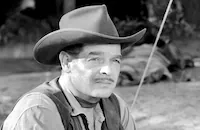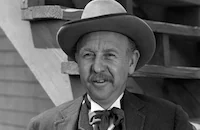Big Town
Brief Synopsis
Cast & Crew
William C. Thomas
Philip Reed
Hillary Brooke
Robert Lowery
Veda Ann Borg
Byron [s.] Barr
Film Details
Technical Specs

Synopsis
Steve Wilson is on his way to Big Town to take over the Illustrated Press as managing editor when his train crashes, killing twenty people. Steve photographs the accident and calls the story in to the Press , but the lazy city desk editor barely acknowledges the story, while their rival, The Chronicle , publishes it on the first page. When Steve reports in for work, he establishes sweeping changes with the approval of publisher Peabody, and his main objective is to increase the circulation of the failing paper. After two weeks, reporter Lorelei Kilbourne returns from vacation to her formerly quiet newsroom to find a bustle of activity. Lorelei, an inexperienced reporter with good instincts, idealistically believes that she and Steve will now fight injustice through the newspaper. However, both Steve and her friend, reporter Pete Ryan, are more cynical about their work. Three months later, Steve seizes on a small item in The Chronicle about a local woman found dead from heart failure in the hotel room of a state senator. Steve sends Lorelei to interview the woman's mother, whom she knows, and she later urges him to drop the story to avoid scandalizing the family. Steve takes Lorelei off the story, but then gives it to Pete. Lorelei threatens to quit when she reads Pete's article, but Steve merely advises her to toughen up or get out of the business. Steve then assigns Lorelei, Pete and a photographer to cover a movie theater hold-up, at which the police are engaged in a gunfight with the robber. After the thief escapes, Lorelei finds a lipstick case on a stairwell and determines that the robber was a woman. Based on her evidence, Steve prints a story with the headline "Pistol Packin' Mama Routs Police Force," and is sharply criticized by the police and by The Chronicle , which accuses him of publishing fiction. Ignoring threats by the police, who believe the thief is a man, Steve instructs Lorelei and Pete to track down every woman sharpshooter in the city. When they bring sharpshooter Vivian Leroy to the office, Vivian pronounces her innocence until the theater cashier, Gerald Meeker, recognizes her when Steve plants a man's hat and coat on her. Vivian then confesses, and, to get back at The Chronicle , Steve establishes her at the newsstand in The Chronicle building, and later publishes a snapshot of Chronicle reporter Lew Fletcher buying a paper from her just before she is arrested. Fletcher is fired, and when he charges into Steve's office and strikes him, Steve is impressed by his fighting spirit and hires him. One day, Steve and Lorelei discover that an amusement park is corrupt and has dangerous roller coasters. Steve decides to shut the place down and publishes daily exposés condemning the park. Peabody, however, orders him to kill the story after the amusement park owner announces his plans to renovate the park, and settles out of court with the family of a man who was killed on a roller coaster. Lorelei is so outraged when Steve gives in to Peabody that she quits and is hired by The Chronicle . To continue to build circulation, Steve sensationalizes a series of murders dubbed the "vampire" murders by Pete. Pete quits, however, when Steve demeans his story that the accused man, Vance Crane, is innocent. Steve investigates Crane and proves that he lied to police. Later, another attacker confesses to the murders, but the news reaches Crane too late, as he has committed suicide in his jail cell. Steve feels responsible for Crane's death because of his merciless campaign to prove him a murderer. Wracked by guilt, Steve writes an editorial with the headline, "I Killed Vance Crane," in which he blames himself and his own yellow journalism for Crane's death. Lorelei's faith in Steve is renewed, and she urges him not to quit. Peabody reinforces Lorelei's plea, accepting equal responsibility for Crane's death, and asks Steve to stay on and use the paper to promote justice. Inspired, Steve immediately calls Fletcher and tells him to start work on a slum exposé and to rehire Pete.

Director
William C. Thomas
Cast

Philip Reed

Hillary Brooke

Robert Lowery

Veda Ann Borg
Byron [s.] Barr

Charles Arnt

Nana Bryant
Frank Fenton

Roy Gordon
Eddie Parks

Nella Walker
Thomas Jackson
Richard Lyden
Crew
Henry Adams
Howard A. Anderson
Mona Barry
Darrell Calker
John N. Cope
Daisy Dewitt
Geoffrey Homes
Geoffrey Homes
Fred Jackman Jr.
L. B. Merman
Nat Merman
Howard Pine
William H. Pine
Maxwell Shane
Maxwell Shane
Earl Sitar
Ray Smallwood
Howard Smith
F. Paul Sylos
William C. Thomas
Glenn P. Thompson
Philip G. Wisdom

Film Details
Technical Specs

Quotes
Trivia
Notes
The viewed print was titled Guilty Assignment. As some of the viewed print's opening credits vary from the original film, the above credits were obtained from the Release Continuity in the Paramount Collection at the AMPAS Library. According to a Hollywood Reporter news item, some scenes were shot on location in Ocean Park, CA. This film was the first in a series based on the radio program "Big Town," created by Jerry McGill. The radio program first aired on CBS in 1937, then moved to NBC where it ran until 1948. The character of "Steve Wilson" was variously performed on radio by Edward G. Robinson, Edward Pawley and Walter Greaza. A television series based on the radio program first aired on CBS on October 5, 1950, and concluded on NBC on October 2, 1956. Patrick McVey initiated the television role of "Steve Wilson," followed by Mark Stevens. The four-part Pine-Thomas series featured Philip Reed and Hillary Brooke in the lead roles, and was directed by William C. Thomas. For further information on the "Big Town" series, consult the Series Index.












